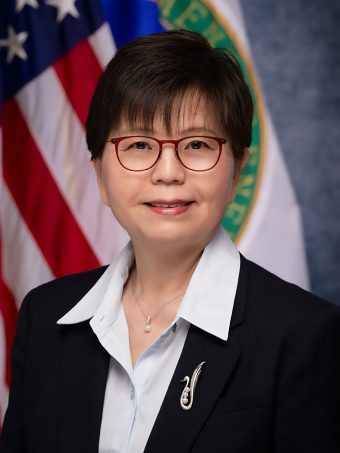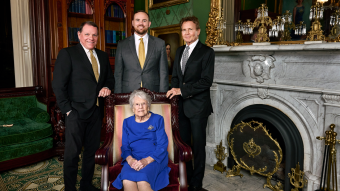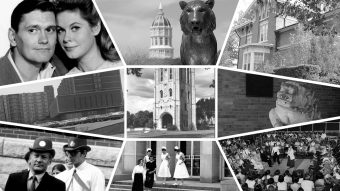President’s Distinguished Lecture Series
Science for Energy10 a.m. Thursday, Nov. 14
Monsanto Auditorium in the Bond Life Sciences Center
Bookmark the livestream
Nov. 12, 2024
Contact: Janese Heavin, heavinj@missouri.edu

Harriet Kung showed a natural aptitude for math and science from an early age, but she credits a transformative middle school physics teacher for building on that foundation.
“He was an inspiring role model,” she said. “He piqued our curiosity about the natural world and helped explain everything to us — and that would stimulate more interests.”
Now, Kung is inspiring others as a leader at the U.S. Department of Energy (DOE)'s Office of Science, where she serves as deputy director for science programs and as a senior career official, providing strategic scientific and management oversight for numerous research initiatives.
After earning master’s and doctoral degrees from Cornell University, Kung began her distinguished career at Los Alamos National Laboratory. She joined the DOE in 2002 and has since spent more than 20 years in leadership roles within Basic Energy Sciences — the largest program in the Office of Science.
During her tenure, Kung has played a pivotal role in positioning the Office of Science as a leader in the National Quantum Initiative. She has developed strategies that leverage the synergy between disciplines such as physics, biology, materials science and engineering, while also maximizing the capabilities of world-class scientific user facilities. In addition, Kung has chaired and co-chaired high-level interagency working groups to establish and implement national science priorities.
As the University of Missouri’s 2024 President’s Distinguished Lecture Series speaker, Kung will present “Science for Energy” at 10 a.m. on Thursday, Nov. 14, in Monsanto Auditorium at the Bond Life Sciences Center.
Read on for a Q&A with Kung.
Can you provide an overview of your upcoming presentation at Mizzou?
The global demand for energy is growing faster than ever, and we need improved technologies for energy generation, transmission and use. While steps have been taken to reduce our dependence on foreign fossil fuels and expand the use of carbon-neutral energy, today’s technologies fall short of what is needed to ensure our nation’s energy future. Breaking through today’s technical bottlenecks requires investments in basic research to develop wholly new technologies. These investments will have huge payoffs for assuring our nation’s future with abundant, affordable, reliable and sustainable energy, as well as good-paying jobs.
Why is it critical that researchers at institutions such as Mizzou continue to investigate and explore new ways to generate, transmit and store energy?
Although this nation has produced innovations like LEDs and heat pumps to greatly improve energy efficiency, the demand for energy keeps going up. To meet this growing demand, it will take teams of scientists and engineers working together to deliver new knowledge and concepts that can be used to devise new technologies that can subsequently be scaled up for manufacturers to enter the marketplace. Addressing issues in energy generation, transmission and storage is a grand scientific challenge that is critical for ensuring the economic and national security of the nation.
How do you see artificial intelligence (AI), quantum computing and other emerging technologies impacting energy supply and demand in the coming years?
The explosion in data analytics, artificial intelligence and other emerging technologies is a critical factor in managing an efficient energy enterprise. From controlling energy used in your car to averting power grid interruptions in your home, more and more “smart” technologies are being incorporated in devices to support energy efficiency and availability. But some of these technologies are extraordinarily energy-hungry, using huge amounts of electricity. That is why the Office of Science is working to develop new technologies such as artificial intelligence, quantum computing and energy efficient microelectronics — and even working with companies to produce next-generation supercomputers — to reduce future energy demand.
What advice would you give students who want to become leaders in science, engineering and technological fields?
First, continue to get the best education you can. Second, seek out opportunities for getting hands-on experience doing research. While you can learn a lot in the classroom, working in a laboratory brings that knowledge to life. Research is not 100% successful, and we always learn from experiments that do not work as we had planned — but when something succeeds, it is so exciting that you can’t stop. DOE has 17 national laboratories that provide rich research opportunities for early career researchers — undergraduate and graduate students, as well as post-doctoral associates. These opportunities range from a few weeks in duration to summer appointments and longer. Every year, thousands of students come to the laboratories to conduct research with our distinguished scientists and engineers and to have the opportunity to use state-of-the-art equipment such as exascale computers, world-leading electron microscopes, powerful x-ray scattering facilities and more.



